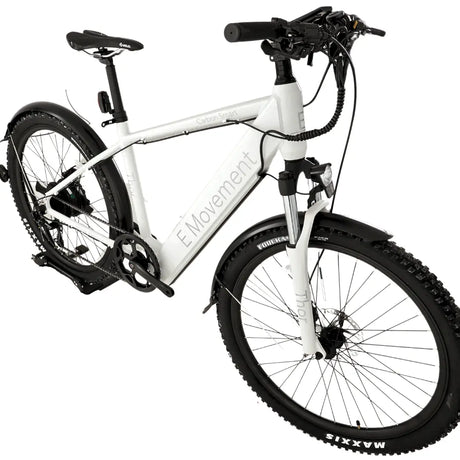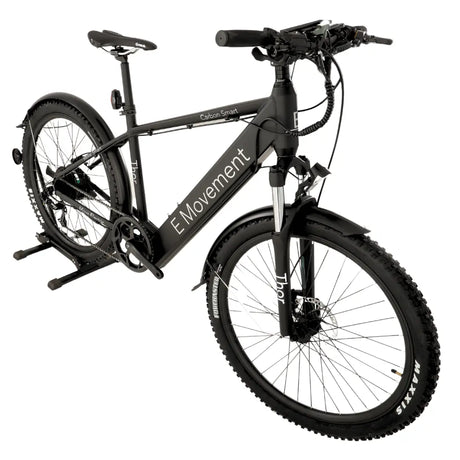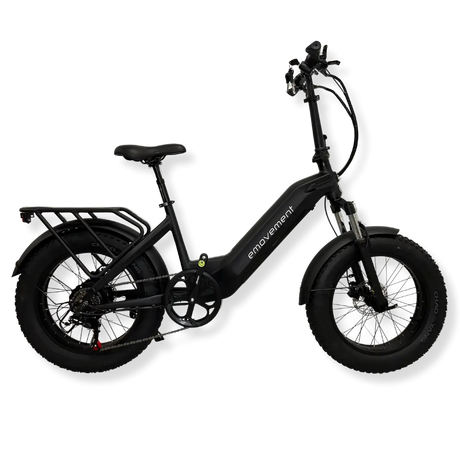As the whole world grapples with the effects of climate change, finding eco-friendly modes of transportation has become more crucial than ever. One such mode is e-cycling, as it effectively reduces one’s carbon footprint. And while electric bikes do require energy to operate, they are much less environmentally damaging than cars and other vehicles. Keep reading as we delve into why e-bikes are the more convenient and responsible choice for both commuting and leisure rides, including environmental benefits of electric bikes like reduced emissions, energy efficiency, and sustainable manufacturing.
Reduced Emissions
Let’s first consider how pedelecs contribute to reduced emissions and also look at real-world data to back up these claims:
Lower Carbon Footprint
A study carried out by the European Cyclists Federation (ECF) explored the overall carbon footprint of different modes of transport. This study considered numerous factors, like the emissions from bicycle production and even the carbon released from the extra food consumption by cyclists due to increased physical activity.
The findings revealed that, despite these considerations, cycling produces around 21 grams of CO2 per passenger kilometre, compared to 271 grams of CO2e per passenger kilometre for a car. E-bikes don’t rely on petrol or diesel and are powered by a combination of human pedalling and electric energy, which drives the bike forward efficiently. No matter how you look at it, choosing to ride a bike is an excellent way to lower your carbon footprint!
Reduced Pollution
An electric bike does not emit any harmful gases or smog, meaning they don’t contribute to air pollution and help lower the risk of respiratory and other health issues—especially beneficial in busy urban areas.
Additionally, they are remarkably quiet, reducing noise pollution and providing a more pleasant experience for pedestrians. Their minimal environmental impact and reduced road disruption make e-bicycles a cleaner, quieter, and more community-friendly way to travel.
Present Statistics and Case Studies
According to a science direct article:
- Electric bikes have the potential to reduce car CO2 emissions by 24.4 million tonnes per year in England.
- The carbon reduction capability of e-bikes is most significant in rural areas.
- There are 3,400 census zones with high potential to replace car travel with bikes and economic vulnerability due to car dependence.
A paper on e-cargo bikes also stated that:
- Four companies that switched from a conventional van to an electric cargo bike in Maastricht saved over a tonne of CO2 in just six months.
- A butcher who started using an e-cargo bike instead of a van whenever possible in London was able to cut CO2 emissions by 75%.

Energy Efficiency
When it comes to energy efficiency, e-bikes are a great way to get around:
Efficiency of Electric Motors
One of the key benefits of these bikes is how they incorporate electric motors that offer superior efficiency. Electric motors can typically convert more than twice the amount of electrical energy into mechanical energy compared to traditional internal combustion engines (ICE). While an electric motor generates torque instantly through electric current and magnetic fields, an ICE one takes longer to combust fuel and turn the crankshaft.
This allows e-motors to deliver full torque right from a standstill, accelerating much faster and more efficiently. They also have far fewer moving parts than those found in an ICE, which significantly reduces maintenance needs. Without a combustion engine, there is no need for frequent servicing, oil changes, or many of the other upkeep tasks required by conventional vehicles.
Battery Innovations
Technological advancements have resulted in durable pedelecs and efficient batteries that provide an environmentally friendly choice for transportation. These batteries can last from a few hours to several days, ensuring ample range while reducing the demand on power sources.
Since e-bicycles are typically charged overnight, their environmental impact can be reduced by charging them during off-peak hours when power grid usage is lower. Along with this, the cost of electricity to charge an electric bike is far less than the monthly fuel expenses of a car. Charging an e-bike costs less than 1p per kilometre, while fueling a car costs over 4.5p per kilometre.
Renewable Energy
E-bikes have the potential to serve as a gateway to integrating renewable energy sources into the transportation sector. By establishing charging stations powered by solar panels or wind turbines, these two-wheeled wonders can be charged using green energy to help reduce pollution and carbon emissions.
The renewable energy approach not only promotes the use of clean energy on a broader scale but also demonstrates the viability of sustainable energy in everyday transit. As more charging points are set up and powered by renewables, we can create a more environmentally friendly infrastructure that supports the shift away from fossil fuels and encourages the adoption of greener transportation options.
Sustainable Manufacturing Practices
One of the main advantages of e-bicycles is their environmentally friendly manufacturing processes. Many companies follow a circular economy model, where components and materials are reused or recycled at the end of their service life. This approach minimises the need for raw materials and reduces waste, aligning with sustainable manufacturing practices.
And most e-bike batteries are lithium ion, meaning they don’t contain toxic elements like lead and are recyclable. By focusing on resource conservation and effective recycling, bikes contribute to a cleaner, greener future and demonstrate a commitment to sustainability from production to end-of-life.
Case Studies
We will now explore some real life examples on how cities are using e-bikes to help contribute to a more environmentally-conscious world and why most people are choosing E-Movement to join the green electric revolution:
City Initiatives
- In Belgium, electric bike incentives are available at both regional and municipal levels. The Brussels-Capital Region provides residents with up to $550 to purchase a new or used e-bike or accessories, while Wallonia offers incentives of up to $1,350, as reported by Electric Bike Report.
- Austria's Federal Ministry for Climate Protection, Environment, Energy, Mobility, Innovation, and Technology is also supporting the use of bikes. Through the end of February 2025, they are offering financial aid for purchasing and operating electric bicycles, electric cargo bikes, and electric folding bikes powered exclusively by renewable energy sources.
- Many regions in France have introduced long-term e-bike lease programs, allowing residents to use e-bicycles for months at a low cost. In Île-de-France, for example, residents can lease an e-bike for around $43 per month, including insurance and maintenance. According to Bloomberg, a "significant" number of people who participate in these programs eventually purchase their own e-bikes.
- In Paris, the Velib bike-sharing program, which started in 2007, now offers over 20,000 bikes for hire. This initiative has helped boost cycling in the city to remarkable levels, with around 840,000 cycle trips made daily, placing Paris among the top cities worldwide for cycling.
User Stories
Hear it from our customers directly on their experience with our sustainable brand and eco-friendly electric bikes:
“Firstly the communication and advice I received from the team was outstanding. Gave me good advice and answered all the questions I had which gave me the confidence to order. The bike came fully assembled and only took 3 working days which again showed outstanding service. The bike feels great, the peddle assist is incredible and it looks amazing. Very very satisfied , thank you for your service.”
“I cannot praise this company highly enough. I bought a bike from E-Movement and although I fell in love with it and used it for a short time I realised it was a bit more than I could manage at my age, mostly because of its size and weight. One email to them and they suggested a swap for a similar but more suitable model - a quick visit to Woking and it was sorted.”
“I bought my bike 2 years ago and I love it,I have had a upgrade lately and the guys there were top notch they have always dealt with anything I needed I recommend the panther bike it’s brilliant”
E-Movement’s Commitment to the Environment
At E-Movement, we are committed to reducing carbon emissions and promoting sustainable travel with our electric vehicles. Every ride on our electric bikes offers not just an exhilarating experience but also helps reduce air pollution and conserve non-renewable resources. As cities face increasing environmental challenges and traffic congestion, we are focused on developing more sustainable products and innovative bike frames that can benefit everyone.
We’re also excited to announce our expansion into the fleet solutions market, providing electric bikes and motorcycles in bulk to government and agricultural organisations. Our priority is to ensure a safe and comfortable experience for our customers, and we are continuously investing in the design of more streamlined and lightweight e-bike models. With E-Movement, every adventure you take is a positive step toward a healthier planet.
Conclusion
For many people, an electric bike is the true alternative to a car. E-bikes are convenient, eco-friendly, and their electric assistance makes it easy to tackle hills or longer distances. Opting for an e-bicycle is part of a larger shift toward sustainable living. We can look forward to more green transportation with advancements in technology, making these vehicles an increasingly attractive choice for the future.
If you're looking to make a positive environmental impact, e-bikes provide a practical and responsible solution. They’re more than just a trend—they represent a lifestyle choice for a greener planet.























































































